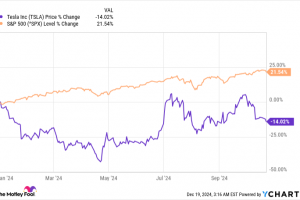
Traders work on the floor at the New York Stock Exchange (NYSE) in New York City, U.S., March 5, 2020.Andrew Kelly/Reuters
Wall Street’s outlook for the stock market in 2024 is too bearish, according to Fundstrat’s Tom Lee.
He pointed to the historical distribution of annual stock market returns.
Since 1900, the S&P 500 has experienced yearly gains of 10% or more 51% of the time.
Wall Street is too bearish on the stock market heading into 2024, according to a Friday note from Fundstrat’s Tom Lee.
He highlighted the historical distribution of yearly equity returns since 1900, which shows that the stock market has gained 10% or more 51% of the time. This year is heading in that direction, with the S&P 500 up 17%.
And yet, early 2024 forecasts from Wall Street analysts suggest flat or low-single-digit returns next year. But this doesn’t line up with history, according to Lee.
Since 1900 (123 years), annual equity returns are distributed as follows:
S&P 500 between 0% to +5% — 11%
S&P 500 between -5% to +5% — 17%
S&P 500 greater than +10% — 51%
Fundstrat
“The point we are making is that flat S&P 500 is the least likely outcome with only a one in ten chance of happening. Yet, that is the expectation of the sell-side and also of investors. To me, that is why 2024 will be a very decisive year,” Lee said.
Early forecasts for the stock market in 2024 include Morgan Stanley’s S&P 500 price target of 4,500, representing flat returns, and Goldman Sachs’ S&P 500 price target of 4,700, representing potential upside of just 4%.
Meanwhile, Fundstrat’s own poll of more than 1,000 investors across its client base show that 51% of respondents expect the S&P 500 to rise between 5% and 10% in 2024.
Those 2024 stock market forecasts suggest there is still a lot of investor skepticism, which is apparent in fund flow data. According to data from S&P Global, retail investors sold US stocks in October at the fastest pace since 2021.
“To me, that really speaks to the capitulation event that reached its maximum levels on October 27 of this year. And we know that when investors capitulate, this…
..






